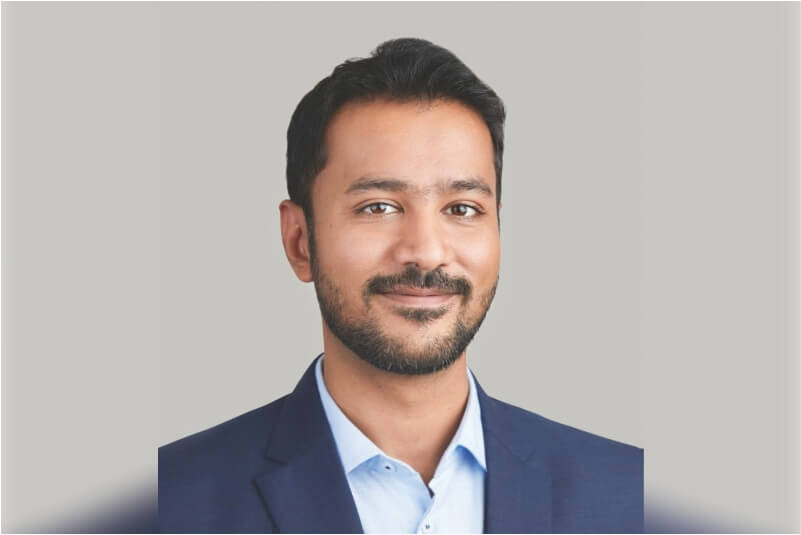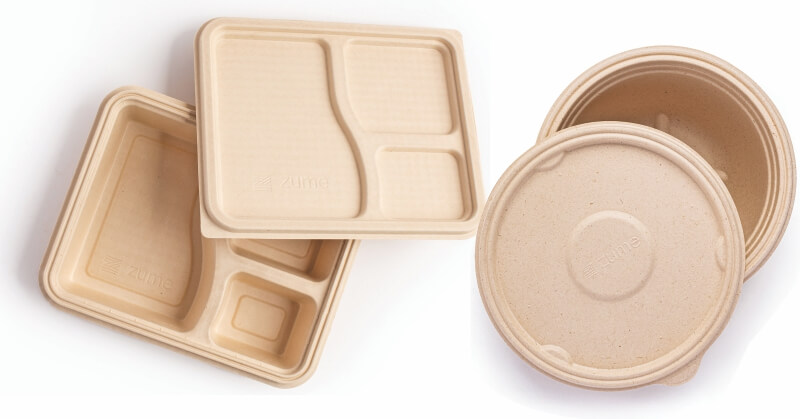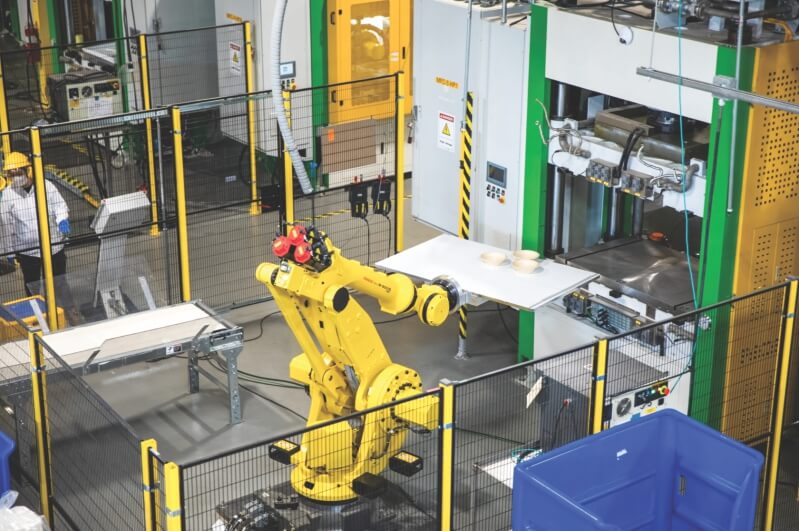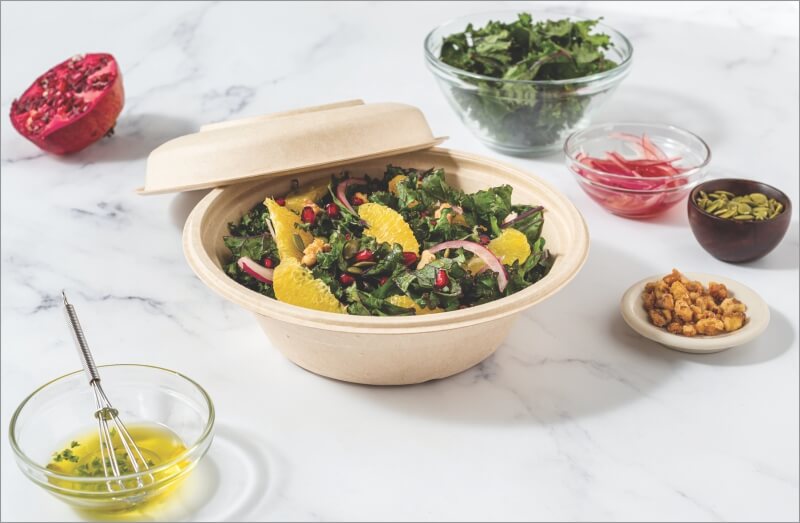“Zume has recently announced the strategic expansion and global distribution of its molded fiber manufacturing technology… These new partnerships bring Zume’s fully compostable packaging solutions to even more international markets and arrive just weeks after the distribution deals across North America, India and Europe that the company announced earlier this year.”

Mr. Vaibhav Goel, Managing Director, APAC & EMEA, Zume Inc. gives us a glimpse into the business journey of Zume, the product portfolio, the manufacturing capabilities of Zume, the advanced molded fiber technology and the ‘Partnership Model’ of the company. Further, he speaks on the recent association with Parason, their future plans, and the outlook of molded fiber products’ market share in the packaging industry in an exclusive conversation with Paper Mart.
Paper Mart: What was the thought that led to the inception of the Zume Inc.? What is the history behind the name of the company and its business journey so far and milestones achieved?
Vaibhav Goel: Founded in 2015, Zume Inc. is a sustainability solutions-company focused on creating economically viable packaging substitutes for plastic. The founder and CEO of Zume, Alexander Garden, started the company with a vision to advance technologies in and around the global food supply chain. Over the last six years, Zume has created the world’s most advanced molded fiber manufacturing equipment and patented technologies that provide global food brands with an alternative to single-use plastics at competitive prices.
Zume has established its product distribution partnerships in more than twenty countries. Among the company’s strategic customers and partners are Boon Distribution, Click Chefs, Detox Folks, Majestic Timbers, Packaging Supplies, Prestige Tissues, Rebel Foods, SealTec, and SR Papers. As well, Zume has recently announced manufacturing partnerships around the globe, including the collaborations with Satia Industries and Parason Machinery, both in India and with Jefferson Enterprise in North America.

PM: Single-use plastic packaging is a large component of the food delivery market — how Zume is trying to end the plastic problem and contribute towards more sustainable packaging solutions?
VG: Everything that moves is in packaging, but the sad reality is that it’s one of the most damaging sectors to our environment with plastic pollution costing USD 13 billion in economic damage annually. Global research studies have shown the flow of plastic into the ocean each year could triple by 2040, and the UN predicts there may be more plastic than fish by weight in the ocean by 2050. At Zume, we believe that a world without single-use plastics is both possible and inevitable.
“Zume pushes the limits of what’s possible with molded fiber and intends to maintain its innovation leadership position in the industry. To do so, we have established a center of excellence at Camarillo, California… This facility has three stock preparation systems and multiple prototyping lines“
That is why Zume has dedicated resources to create an alternative to plastic and Styrofoam. Our single tech stack offers the hardware, software, and services to make it easy and possible to swap out plastic packaging with sustainable alternatives. We offer plant-based replacement products that are compostable, made of moldable fibers such as bagasse (sugarcane fiber), bamboo, wheat, straw, and blends of various grass fibers.
PM: Tell us about the product range offered by Zume — including a turnkey bundle of hardware, software, and services.
VG: Zume’s molded-fiber consumer products are designed and manufactured in a manner that performs as well or better than plastics. They are “backyard” compostable in 90 days, making them optimal in the effort to replace single-use plastics today and in the future. The products such as – cups, lids, multi compartment food trays, bowls, plates, curry bowls are manufactures and distributed by Zume. Further, the company provides professional services that allow the clients to leverage Zume’s software, design, and manufacturing capabilities to create unique, branded molded-fiber packaging that meets the uniquely required shape, size, capacity, and design of individual brands.
Our manufacturing partners leverage our patented molded-fiber manufacturing technology which is the most advanced in the world. In addition, our professional services enable our partners to become leaders and make pioneering efforts to replace single-use plastics around the world with financially viable and sustainable consumer goods.

PM: Please outline the manufacturing capabilities of Zume – for both sustainable solution containers and technology and equipment. Share details about the infrastructure of your production facility.
VG: Zume MFCs are fiber agnostic, enabling Zume to deploy our technology worldwide, with the capability to produce simple (tableware) and complex (industrial packaging) parts on the same machine, while maintaining cycle times that are fastest in the industry. Traditionally this is achieved by installing different types of machines. Zume MFCs can produce parts with both side smooth finish and near-zero draft angles that enable plastic-like performance. All these features and more, enable higher throughput, better yields, and an efficient, financially attractive payback period for our partners.
PM: Tell us more about Zume’s Advanced Molded Fiber Technology and its ‘Partnership Model’ where companies can manufacture molded fiber products using its proprietary design and technology. What makes Zume’s Molded Fiber solutions technologically innovative and interesting?
VG: An ideal partner for Zume has the access to pulp, power, and willingness to help solve the global plastic problem. We provide turnkey solutions to manufacturing partners, including MFCs and all auxiliary equipment through a network of preferred vendors and integrators.

“As a part of this partnership, Parason is helping Zume further optimize stock preparation and other auxiliary systems that complement our core manufacturing technology.“
The Zume business model embraces the core competencies of both parties involved, where partners focus on production and operations and Zume provides the design, technology, prototyping, and access to a global sales force. Partnering with Zume is a win-win situation as partners can diversify into a high-yielding asset and Zume can deploy the technology at scale, and a much faster pace.
PM: Molded fiber manufacturing has gained huge commercial importance in recent years. However, there is still an arising need to consolidate the best practices from R&D to increase its implementation. Could you explain the R&D process that leads up to the creation of Zume’s Advanced Molded Fiber Technology?
VG: Molded fiber (Type-3 and Type-4) technology is relatively new and fragmented and there is limited consolidation of best practices. Zume pushes the limits of what’s possible with molded fiber and intends to maintain its innovation leadership position in the industry. To do so, we have established a center of excellence at Camarillo, California, which provides opportunities to all stakeholders in the ecosystem. This facility has three stock preparation systems and multiple prototyping lines to rapidly iterate on breakthrough solutions. The company works with the top material scientists, chemical and additive companies, mold manufacturers, etc. to solve existing limitations of molded fiber products.
PM: Recently, Zume has partnered with Parason Group to launch the most advanced Molded-Fiber Manufacturing Facility in Southeast Asia — could you brief more about this collaboration?
VG: Parason is constructing a Greenfield factory where the Zume manufacturing technology will be deployed. With this deal, Parason has joined a network of Zume’s manufacturing partners around the globe, expanding the availability and market share of Zume sustainable goods that replace plastics and styrofoam.
As a part of this partnership, Parason is helping Zume further optimize stock preparation and other auxiliary systems that complement our core manufacturing technology. These efforts enhance Zume’s capability to deliver turnkey solutions globally with partners eager to leverage Zume’s manufacturing technology.
PM: Zume has also tied up with Satia Industries for the supply of patented paper cutlery products — could you tell us more about this association?
VG: Initially, Zume and Satia Industries will deploy more than 2,000 tons of self-sealing, sustainable molded-fiber products to be manufactured and marketed during the first year of the partnership. Satia Industries plans to enhance its expertise and expand its product offering basket through the association by providing customized molded fiber packaging solutions across multiple industries such as food, consumer packaged goods, electronics, cosmetics, healthcare, and pharmaceutical.
PM: Please elaborate on the market footprint of Zume globally. What are your plans to expand to newer markets in the future?
VG: Zume has recently announced the strategic expansion and global distribution of its molded fiber manufacturing technology, including the partnerships with major distributors and manufacturers across more than 20 countries including Packme Ltd (UK), Seamlessly Ltd (UK), Transcend Packaging (UK), Rausch Verpackung GmbH (Germany, Austria, Switzerland), Eocrep SARL (France), Korrex Group (Russia and CIS), and No Waste Living IKE (Greece), among others. The deals will bring sustainable packaging solutions to the UK, Germany, Greece, Austria, Switzerland, France, Russia and more.
These new partnerships bring Zume’s fully compostable packaging solutions to even more international markets and arrive just weeks after the distribution deals across North America, India and Europe that the company announced earlier this year. Most recently, the company has announced three groundbreaking sustainable manufacturing deals both stateside and internationally with Texas-based Jefferson Enterprise Energy as well as Parason and Satia Industries of India.

PM: What is your overall assessment of molded fiber products’ market share in the packaging industry? What is the future of molded fiber packaging?
VG: The world’s single-use plastic packaging industry is valued at over USD320B and is ripe for innovation. Meanwhile, the global trend toward increased sustainability is driving significant growth in molded fiber solutions as a leading sustainable alternative to single-use plastics. It is estimated that around USD10B to USD20B worth of single-use plastic packaging will convert to molded fiber. Zume uses its superior equipment, product design, and technology advantages to drive this conversion at the most accelerated pace possible.
“UBS estimates the global food delivery business is estimated to grow more than ten times, from USD 35Bn in 2018 and is projected to reach USD 365Bn by 2030. This has motivated Zume to create a first-of-its-kind, and plant-based compostable packaging that matches the performance of plastic, but comes at a lower cost”
We see a massive opportunity in: transforming the world’s food industry into a globally sustainable food system by providing sustainable packaging alternatives to the world’s largest food brands and manufacturers.
While packaging is used in almost everything we buy, the world’s inability to sustainably dispose of packaging is polluting our waterways, and when incinerated, our air. In response, the policymakers have recently started to do their part with more than 150 single-use plastic bans around the world. Most of these bans have focused on straws, utensils, and plastic bags. This is a great start. Yet despite these bans, the Ellen MacArthur Foundation estimates that plastic production is expected to double in 20 years and almost quadruple by 2050, driven in part by global food delivery.
UBS estimates the global food delivery business is estimated to grow more than ten times, from USD 35Bn in 2018 and is projected to reach USD 365Bn by 2030. This has motivated Zume to create a first-of-its-kind, and plant-based compostable packaging that matches the performance of plastic, but comes at a lower cost when produced at a large scale.



